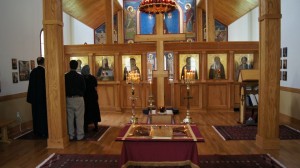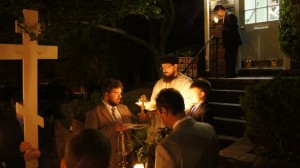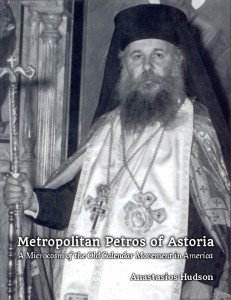My 2013 Paschal Weekend Adventure
Last Sunday, May 5, Orthodox Christians around the world celebrated Easter, which we generally refer to as Pascha. Having received a kind invitation to visit my friend Fr. George Psaromatis in Maryland and stay with his family, I took Friday off and began my journey by car. There are three services that are generally served on Holy Friday in our Church, two of which are generally well-attended by the faithful: Vespers with the Unnailing from the Cross, which is generally celebrated in the early afternoon Friday, and the Matins of Holy Saturday, celebrated Friday evening by anticipation.
I couldn’t make the 1 pm Vespers service in Maryland, and I also wanted to pay a visit to my friends at St. Seraphim of Sarov Orthodox Church in Richmond, Virginia, where Fr. Nicodemos Gayle is the priest. They were having Vespers at 2 pm, so I decided to stop there on my way up to Maryland to pray with that community. It proved to be a good choice; I wasn’t rushed in my driving, and the service was fantastic. They have a beautiful building; their old building was gutted by fire, and they were able to rebuild from scratch a traditional Orthodox Church edifice a few years back.
This was also my first time back to Church since I resigned the priesthood and returned to the lay state. I was a little apprehensive, fearing the unknown, but Fr. Nicodemos told me he would take care of notifying people so there would be no surprises. When I arrived, everyone was completely welcoming, and I felt touched by their kindness. After the one hour service, which features a symbolic taking down of an icon of Christ on the Cross and wrapping Him in a burial sheet, followed by bringing out the Epitaphios, a type of burial shroud with an icon of Christ in the tomb on it, we had light refreshments, this being a strict fast day, and then I took leave of these kind Christians and continued on my way.
The journey up to Crofton, Maryland was a long one. I expected there to be traffic, but it was worse than I had expected. The Washington, DC area has some of the worst traffic in the country. What should have taken me 2 hours took me 3 hours. The Matins service at St. Nicholas Orthodox Mission in Crofton began at 6 pm, but I arrived at 6:50 pm. I feared I had missed a lot, but thankfully, the service continued on for another three and a half hours, ending at 10:30 pm. Orthodox services are blissfully long!
What does one do for four and a half hours in Church, you might ask? The entire service is chanted, with beautiful ancient melodies resonating throughout the room. The priest often comes out of the altar area in order to cense (which means to produce incense with a tool called a censer), or perform other actions. We also had a procession outdoors around the block that evening. Bible readings occur, and basically we perform a funeral service for Our Lord. Holy Week in the Orthodox Church is not a bystander event, but one which draws the worshippers into the midst of the action, not just remembering what occurred 2000 years ago, but making us a part of it anew, as we go through the journey with Christ through His Crucifixion, Burial, and Resurrection.
St. Nicholas is a mission community, which means it is just getting started, so it doesn’t have a fancy building, but it has a core group of faithful who are working hard to establish a permanent place of worship. For the meantime, they are meeting in a rented facility, which although small and makeshift, does not lack anything and is in every way as Orthodox as an established parish such as St. Seraphim’s.
After the service, I returned to Fr. George’s brother’s home, where I was treated to kind hospitality by his brother and sister-in-law. We got to sleep late, and then awoke Saturday morning in order to have another service, this time a Divine Liturgy (communion service). At this point, the priest in many local traditions changes from dark vestments to light vestments, although such is not too common in the Greek practice. There are 15 readings from the Old Testament, the most prominent being one from the Book of Daniel, where we recount the Three Youths (Shadrack, Meeshack, and Abendnago) in the furnace, and then chant a magnificent hymn called “Arise, O God!” where we celebrate Christ’s breaking the bonds of death and Hades (the realm of death, Sheol, where all the dead of the Old Testament went, regardless of whether they were good or not; no one could enter Paradise until Christ destroyed the power of Death). In some places in Greece and the Arab nations, bay leaves are thrown and chairs and other things are banged to symbolize the locks being shattered. Fr. George and the parish did not do this, not being familiar with the practice, but I hope to cross-pollinate a little by next year and see it happen there…forgive my presumption!
Holy Saturday afternoons are for rest; Fr. George and I went to lunch to discuss the recent events of my life, and he gave me encouragement and good advice. Then back to the house for rest. We returned to the Church at around 11 pm, and the Pascha service began! The moment was finally here, that we had been waiting for! The beautiful hymns of Resurrection, joyous in both content and nature, replaced the slow, somber melodies we had previously heard. The tomb is empty! Christ the Lord is risen! Orthodox Christians sing a hymn that goes like this:
“Christ is risen from the dead; by death hath He trampled down death by death, and on those in the graves, hath He bestowed life!”
It is repeated a multitude of times throughout the five hour service.
We ended around 4:30 in the morning, and then broke out the meat and dairy products—food that Orthodox Christians fast from during the 40 days of Lent and 7 days of Holy Week. Not only were we spiritually renewed, but we feel a joyous physical relief from the burdens of fasting.
Coming back to the house, I went to sleep, only to be awoken by Fr. George’s five children playing around 10:30 am. I came out and began to speak to them. They are kind, intelligent children, ranging in age between 2 and 10, and I truly enjoyed speaking with them. They are also extremely polite; they offered to help me carry my luggage to the car. I see in them the result of good parenting, and hope for the same in my own life. High expectations combined with lots of love and attention from the parents—founded in a life of prayer, of course—are the right mix to ensure well-behaved children.
A brief 30 minute service was held around 1:30 pm, and then I took leave of this pious Christian family. They were headed for the big parish barbeque (lamb is generally roasted on a spit by Greeks Pascha afternoon) owing to needing to travel back home, but even so, I left feeling fulfilled and refreshed.
As an aside, I have to mention that something ironic happened while I was there. When I was a priest doing mission work among Americans, I always saw myself as a type of bridge between the Greeks up North at the Cathedral and the converts I was baptizing in the South. Many Greeks are sensitive to their culture being preserved, and rightfully so; however, at times this goes over into issues of language in services, and there are concerns about what is going on in missions with English liturgies and people not being familiar with Greek, Greeks, and the history of the Church in Greece.
From the convert perspective, there is of course the concern that one does not need to become another culture in order to become Orthodox, and an expectation that liturgy would be in a language that they understand, and so I generally would try to show people that there is a type of generic Orthodox culture and way of life that has to be grasped in addition to the dogmatic side of things, while also showing the Greeks I know that English liturgies do not take away from their own experience of the faith. I learned some Greek and even can sing several Greek folk songs so that Greeks would know that what I was doing was in no way aimed at changing the Church they grew up with.
Well, there were a lack of Greek people who were trained in chanting this time around, so yours truly was handed the book several times in order to execute some of the chant in Greek for the benefit of those who were first-generation Greek speakers. I also was asked to read the Catechetical Homily of St. John Chrysostom in Greek after Fr. George read it in English. He is able to read Greek, but only if he practices it thoroughly, which didn’t happen owing to the hustle and bustle of the week. So the convert guy saved the day for Greek chant and readings. Funny how things work out sometimes!
I would also like to add that this was the first time in five years that I had experienced Pascha as a layman, and had been at my mission Nativity of the Holy Theotokos Orthodox Church in Greenville, North Carolina in years past. In 2012, we had 32 people there, having started in 2008 with 3 people. I always enjoyed spending Pascha there with the fine people of the parish, and while I had a blessed time in Virginia and Maryland, I truly missed my old parish community during this holy time of the year.
Having become refreshed at these two Orthodox Christian parishes, I highly recommend them to anyone in the area. St. Nicholas Mission will be getting a website soon, at which point I will update this blog post. Whether convert or cradle Orthodox, these two traditional Orthodox parishes will provide you with the means to have peace in your life and save your soul. I thank God for allowing me to worship with them last weekend.




